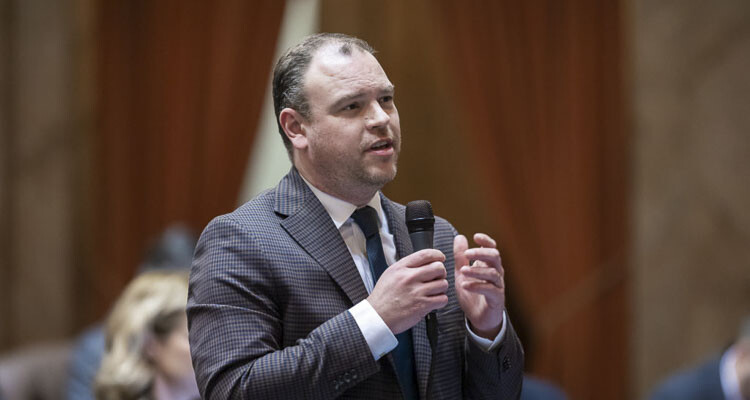
Cheney: ‘We need to give law enforcement and prosecutors more tools to combat this rising crime’
A bipartisan proposal introduced this week in Olympia would crack down on both sellers and buyers of precious metals tied to catalytic converter theft.
House Bill 1840, sponsored by Rep. Greg Cheney, comes at a time of increasing catalytic converter theft across the state, costing victims thousands of dollars in repairs as well as disrupting daily lives.
“It doesn’t matter where you live. From what law several law enforcement agencies are showing us, the crime of catalytic converter theft is skyrocketing in every corner of the state,” said Cheney, R-Battle Ground. “The price tag for repairing the automobiles and the disruption that happens to daily lives comes at a time when many families are already feeling the pinch of higher fuel and food costs.
“We need to give law enforcement and prosecutors more tools to combat this rising crime,” said Cheney. “Especially with Oregon having already passed similar legislation. Thieves now have a greater incentive to cross state lines and sell stolen metal in Washington.”
Cheney’s bill creates a class C felony for a second or subsequent offense of removing or obliterating identifying information on catalytic converters and a sentencing enhancement for stealing private metal property that is sold online. This would also apply to scrap metal businesses that purchase catalytic converters unless the owner can prove it came from his or her own car.
The bill states, in part:
“No scrap metal business may enter into a transaction to purchase or receive private metal property from any person who is not a commercial enterprise or owner of the vehicle from which the catalytic converter was removed. No scrap metal business may enter into a transaction with an owner of a vehicle from which a catalytic converter was removed unless the owner provides the year, make, model, and vehicle identification number for the vehicle from which it was removed.”
Section 2 of HB 1840
In 2021, more than 12,000 catalytic converter thefts were reported in Washington state. That number is expected to be significantly higher once final data is collected for 2022.
“Unfortunately, the ease in which a criminal can cut off and steal catalytic converters for their precious metals makes it an attractive option for those looking for a quick financial score,” said Cheney. “As technology evolves, more and more precious metals are needed to keep up with demand. Our criminal code needs to evolve as well to protect the law-abiding members of our communities.”
His bill also funds the Washington Association of Sheriffs and Police Chief’s comprehensive state law enforcement strategy targeting metal theft and a “no-buy” data base program. Both were created a decade ago but never funded.
While the policy committee cutoff for the 2023 legislative session has passed, Cheney said no bill is truly “dead” in Olympia.
“If it’s important enough, the majority party can bring this bill straight to the floor for a vote,” said Cheney. “I’m hoping the bipartisan nature of the bill and the glaring need to crack down on catalytic converter theft will be enough to get us over this legislative hurdle.”
The 105-day 2023 legislative session is scheduled to end April 23.
Information provided by Washington State House Republicans, houserepublicans.wa.gov
Also read:
- Opinion: Where do we go from here at Ridgefield School District?When it comes to the Ridgefield School District bond proposal, Heidi Pozzo believes the message should be clear: people are unhappy their perspective is not being heard and considered.
- Clock running on gathering signatures on three new initiatives to people of WashingtonBackers of three new initiatives to the people of Washington state have around eleven weeks to gather signatures, if they hope to qualify for the November ballot.
- Letter: Officer Mendoza stood up for public safetyClark County Public Safety Alliance Co-Founder Ann Donnelly provides context of support for Officer Andrea Mendoza.
- Juvenile arrested for felony assault of motherOn Thursday at about 8:48 a.m., Battle Ground Police Department officers were dispatched to an active assault with a weapon in the 1600 block of SW 4th Street in Battle Ground.
- Vancouver Fire responds to porch fireAt 10:20 a.m. on Friday, the Vancouver Fire Department was dispatched to 7319 NE 110th Ave. in Vancouver. First-arriving units found a back porch fire on a single-story house.
- Vancouver Fire responds to apartment building fireAt 2:02 a.m. on Friday (April 19), the Vancouver Fire Department was dispatched to the report of a fire at 306 NE 104th Ave in Maple Ridge Apartments.
- Clark County Sheriff’s Office releases critical incident video from 4/13/2024Following a deputy-involved shooting, the Clark County Sheriff’s Office, at the discretion of the sheriff, will release body-worn camera videos of the incident.











